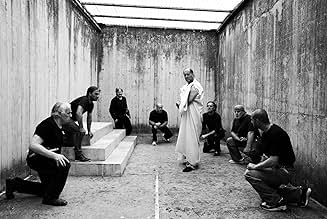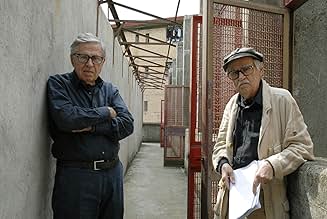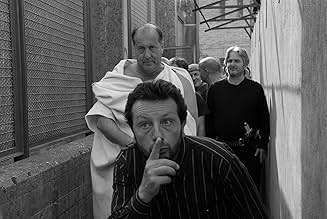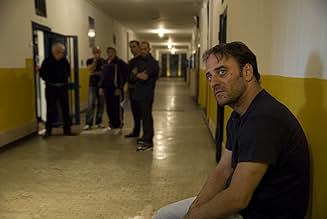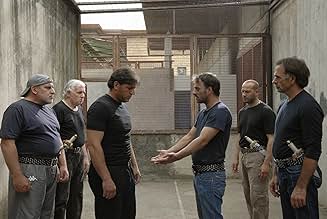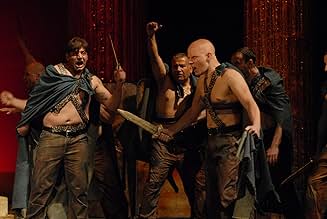AVALIAÇÃO DA IMDb
7,3/10
6,9 mil
SUA AVALIAÇÃO
Adicionar um enredo no seu idiomaInmates at a high-security prison in Rome prepare for a public performance of Shakespeare's "Julius Caesar."Inmates at a high-security prison in Rome prepare for a public performance of Shakespeare's "Julius Caesar."Inmates at a high-security prison in Rome prepare for a public performance of Shakespeare's "Julius Caesar."
- Direção
- Roteiristas
- Artistas
- Prêmios
- 16 vitórias e 21 indicações no total
- Direção
- Roteiristas
- Elenco e equipe completos
- Produção, bilheteria e muito mais no IMDbPro
Avaliações em destaque
Perhaps its the beautiful rolling sound of the Italian dialogue telling the story of Julius Cesar that made this enjoyable at least to the auditory sense. Perhaps it was that the language was sometimes amended to be more modern and meaningful. Perhaps it was the explained parallels of some of the prisoners experiences that helped to make the context more understandable. No matter, it was a thoroughly great way to start the Sydney Film Festival. The fact that this was a script within a script set in a prison using some real life prisoners didn't detract from anything in this film for me - I go to the cinema generally looking for a story, a fabrication, an unreality dressed in reality. I liked the gritty black and white, the sub-line of the prison life and setting. Yes, perhaps a prisoner saying he now felt caged etc didn't have to be said because it was obvious, but all in all a very enjoyable watch. I was engaged and participating from beginning to end. For me, one of the better versions of Julius/Shakespeare and a nice twist on an old but everlasting story.
After attending the premiere of "Cesare Deve Morire", I was not so sure about the movie. It was a good movie, but somehow essayist, rather loose, not catchy. The outstanding performance of Salvatore Striano (Brutus) was striking and rewarded by the audience. The beautiful composition of black and white pictures was of high aesthetic value. It is a very calm movie, the music is nearly minimalistic.
So how come it had a huge impact on me - later? In contrast to most other movies I had seen in Berlin, it was important. Other movies dealt with existentialistic, superficially more important topics than with some prisoners rehearsing a Shakespeare play. Yet "Cesare Deve Morire" had more to say and thus it deserved the Golden Bear. The questions it poses are the same ones as in the Shakespeare play in interrelation with the real destiny of the imprisoned play actors. Even though it is not a particularly spectacular movie, it has the tenor of what makes a strong movie: Importance. The filmmaking is of minor importance, the idea is in the foreground, which is the right decision. The play continues in our minds after the final curtain. Impressive.
So how come it had a huge impact on me - later? In contrast to most other movies I had seen in Berlin, it was important. Other movies dealt with existentialistic, superficially more important topics than with some prisoners rehearsing a Shakespeare play. Yet "Cesare Deve Morire" had more to say and thus it deserved the Golden Bear. The questions it poses are the same ones as in the Shakespeare play in interrelation with the real destiny of the imprisoned play actors. Even though it is not a particularly spectacular movie, it has the tenor of what makes a strong movie: Importance. The filmmaking is of minor importance, the idea is in the foreground, which is the right decision. The play continues in our minds after the final curtain. Impressive.
It's rather discardable. The directing brothers were frustrated as they tried to create something as interesting as Kaos, Fiorile or Luisa Sanfelice. If this is up to the Golden Berlinese Bear, it's a sign of how low the level of current productions is. This is meta-theatre, set in Rebibbia, a high-security prison in Rome. The performers are real life convicts. "Cesar must die addresses the links between drama and reality , but working with amateurs didn't help. The film may be useful as kinda sociological propaganda, but it never qualifies as 'Cinéma vérité,' the meta-style of fiction-documentation filmmaking developed by Edgar Morin and Jean Rouch, inspired by the former theories about Kino-Pravda. I do call it a kind of Reality Show, though. Aren't Inmates Survivors & Big Brothers who are Keeping Up with the Roman Kardashians after all? ;-)
I saw the world premiere of this movie at the Berlinale, where it won the golden bear last night. The movie is not bad, but also not special. The basic idea -real prison inmates play Shakespeares "Julius Caerar"- makes the movie interesting and the impressive acting makes you often forget, what fate those men face and what brought them to prison (murder, mafia-crimes etc). But since you know all that from the promotion already, the movie sometimes just leads up to watching an old Shakespeare-play, which we also already know. Just some philosophic aspects (at the end) and the idea of not showing the actual play, but the criminals only practicing it most of the time, is very entertaining.
Unable to snap up a ticket for this during Berlinale Film Festival (where it also won the grand prize), I've been itching to see Caesar Must Die (Cesare deve morire) for quite some time now. The latest from veteran Italian duo, Paolo and Vittorio Taviani (Padre Padrone, Kaos), it's a documentary-fiction hybrid observing the rehearsals and final performance of William Shakespeare's Roman masterpiece 'Julius Caesar'. What makes this movie noteworthy is it's idiosyncratic formalities: the play is being performed from Rome's high security Rebibbia Prison, and the players are it's incarcerated residents: an ensemble cast of murderers, drug dealers and thieves.
The brothers waste no time with needless exposition on the inmates' backstories or crimes. Instead, the pair focus, with brutal proximity, how these criminals connect with the words of "The Bard". Aside from the final, veracious performance, it's all shot in stylised black and white, as we see the production being set up, the rehearsals in the prison courtyard, and the delicate moments these wrongdoers spend behind cell bars. As is often the case with the Taviani's back-catalogue, there's moments filmed in tender close-ups; loading objects such as an empty chair or a wooden sword an implausible subtext.
That meta-narrative carries over to the inmates themselves, and ends up confusing us. Not only are they performers in the Shakespearean sense, it quickly becomes clear that they are being presented as poetical cyphers of their real life criminal selves. It's a shameful attempt at allegory – expressing how the elder words of Shakespeare relate to contemporary penal society, and in doing so removes any sense of empathy we would have otherwise had for the inmates.
Although the "play-within-a-film" gimmick is a good one, it's hardly original (Charlie Kaufman's Synecdoche, New York and Canadian filmmaker John Greyson's Lillies are both really worth a look). It's also not the best part of Caesar Must Die. With such astounding performances and beautiful adaptation of Shakespeare's words, one wishes that the Tatvianis abandoned the ostentatious stunts and luscious monochrome display, and instead focused plainly on documenting these ostracised people. An extraordinary, grotesque bunch, who find happiness, solidarity and hope in creative expression.
Read more reviews at www.366movies.com
The brothers waste no time with needless exposition on the inmates' backstories or crimes. Instead, the pair focus, with brutal proximity, how these criminals connect with the words of "The Bard". Aside from the final, veracious performance, it's all shot in stylised black and white, as we see the production being set up, the rehearsals in the prison courtyard, and the delicate moments these wrongdoers spend behind cell bars. As is often the case with the Taviani's back-catalogue, there's moments filmed in tender close-ups; loading objects such as an empty chair or a wooden sword an implausible subtext.
That meta-narrative carries over to the inmates themselves, and ends up confusing us. Not only are they performers in the Shakespearean sense, it quickly becomes clear that they are being presented as poetical cyphers of their real life criminal selves. It's a shameful attempt at allegory – expressing how the elder words of Shakespeare relate to contemporary penal society, and in doing so removes any sense of empathy we would have otherwise had for the inmates.
Although the "play-within-a-film" gimmick is a good one, it's hardly original (Charlie Kaufman's Synecdoche, New York and Canadian filmmaker John Greyson's Lillies are both really worth a look). It's also not the best part of Caesar Must Die. With such astounding performances and beautiful adaptation of Shakespeare's words, one wishes that the Tatvianis abandoned the ostentatious stunts and luscious monochrome display, and instead focused plainly on documenting these ostracised people. An extraordinary, grotesque bunch, who find happiness, solidarity and hope in creative expression.
Read more reviews at www.366movies.com
Você sabia?
- CuriosidadesPaolo and Vittorio Taviani heard about the prisoners acting program and contacted Fabio Cavalli with the idea of doing Shakespeare's play and shot the whole experience.
- ConexõesFeatured in Film '72: Episode dated 27 February 2013 (2013)
Principais escolhas
Faça login para avaliar e ver a lista de recomendações personalizadas
- How long is Caesar Must Die?Fornecido pela Alexa
Detalhes
- Data de lançamento
- País de origem
- Centrais de atendimento oficiais
- Idioma
- Também conhecido como
- Caesar Must Die
- Locações de filme
- Empresas de produção
- Consulte mais créditos da empresa na IMDbPro
Bilheteria
- Faturamento bruto nos EUA e Canadá
- US$ 76.908
- Faturamento bruto mundial
- US$ 1.567.339
- Tempo de duração
- 1 h 17 min(77 min)
- Cor
- Mixagem de som
- Proporção
- 1.85 : 1
Contribua para esta página
Sugerir uma alteração ou adicionar conteúdo ausente


